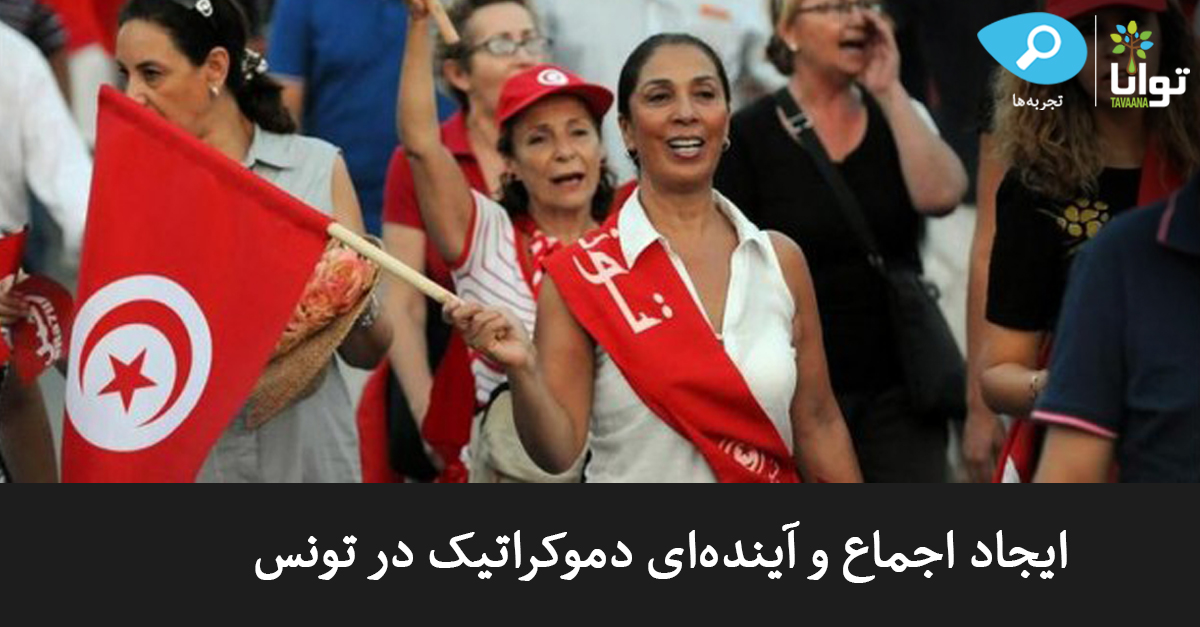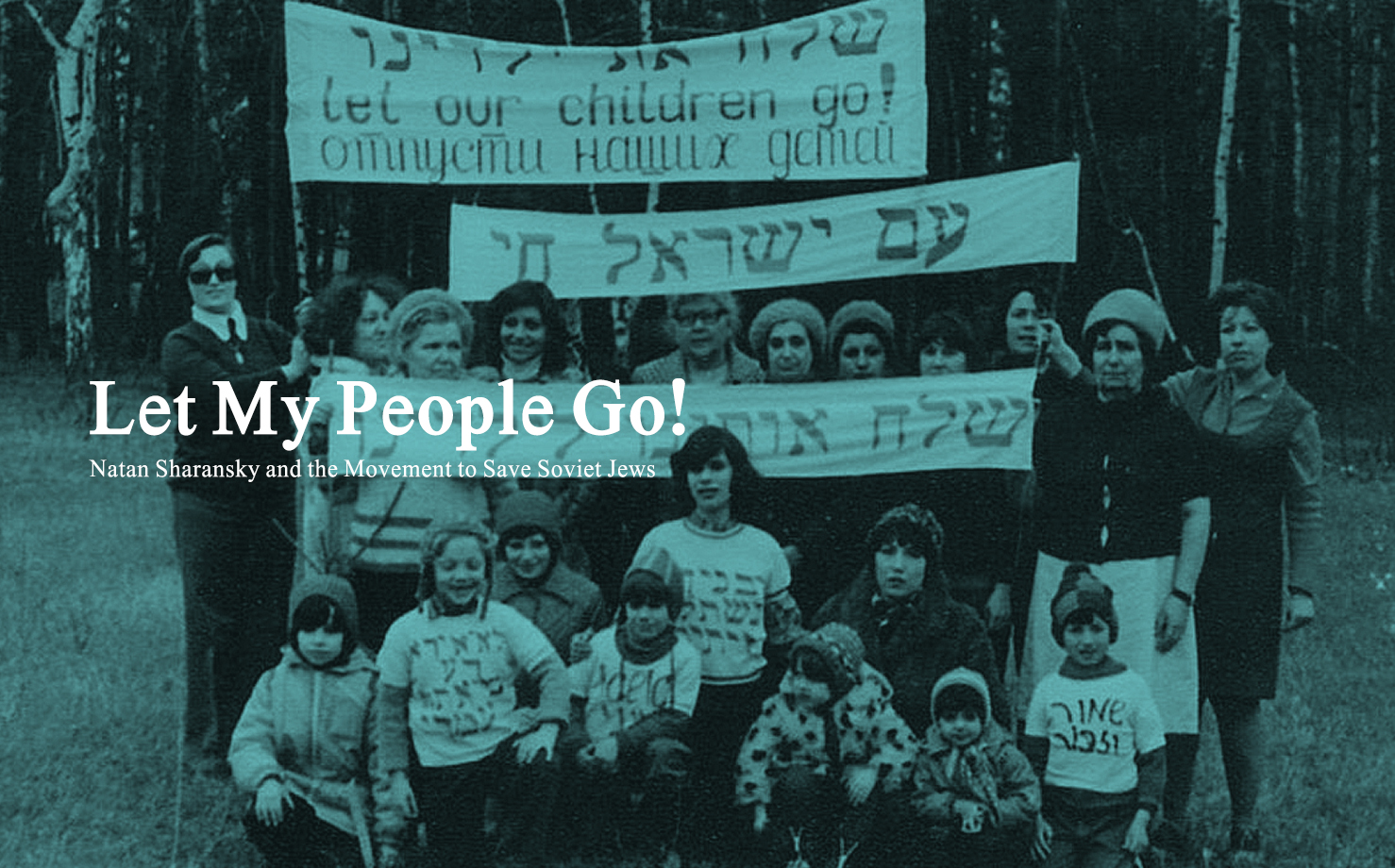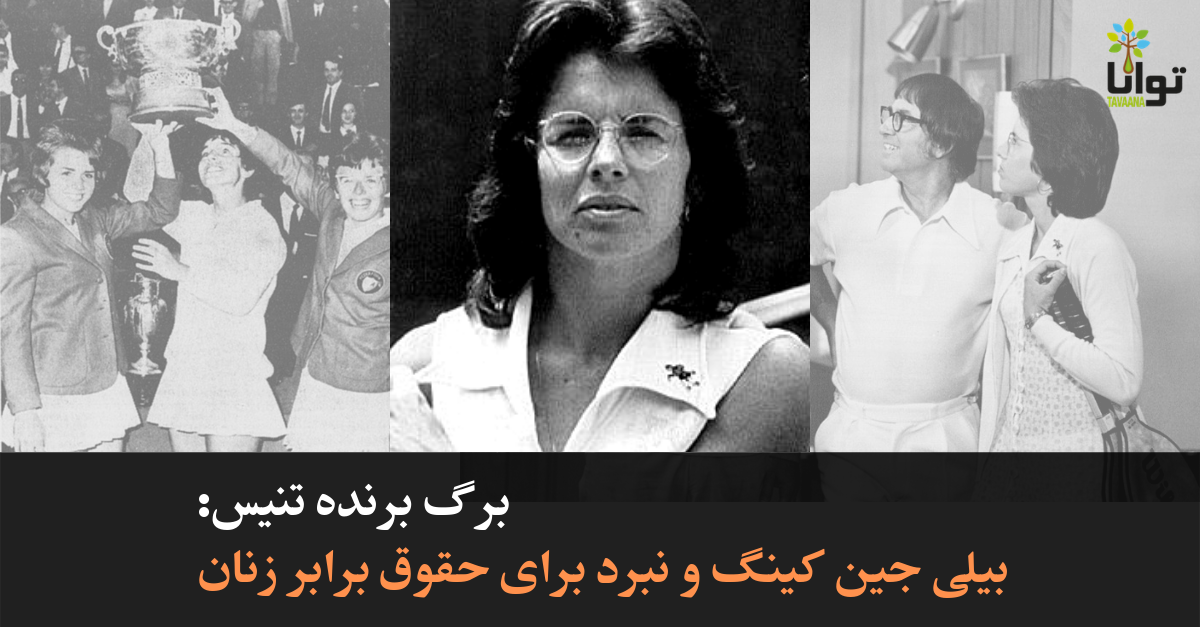Vision and Motivation
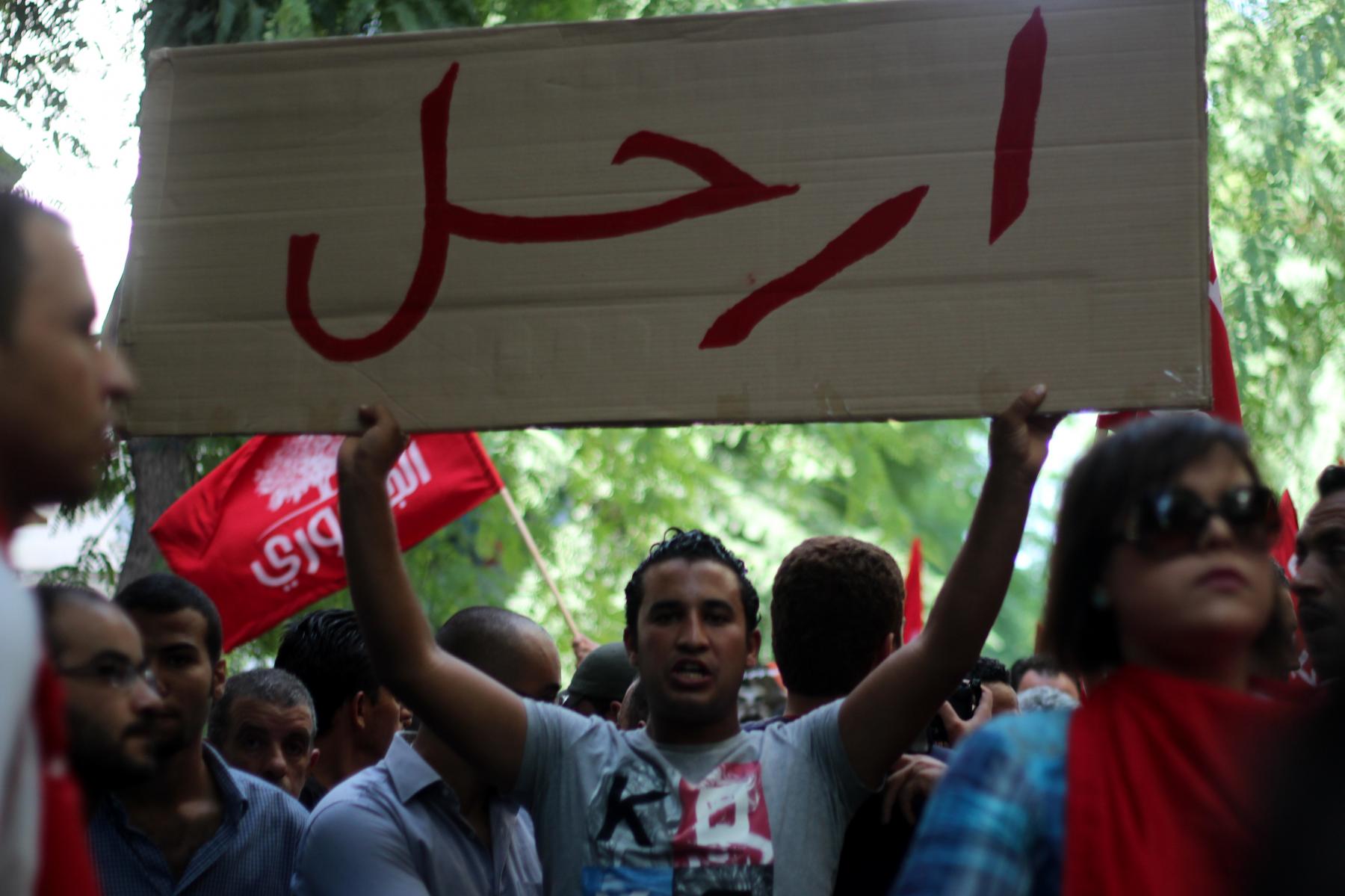
“The people want the fall of the regime!”
“Get out!”
“Government of traitors, resign!”
The thousands of protestors filling central Tunis in October 2013 chanted the very same slogans that had brought down the Ben Ali regime two years earlier – but now they directed their fury at a different government.[1] In the wake of the initial promise of the Arab spring, its birthplace, Tunisia, was now wracked with violence, political paralysis, economic challenges, and deep public discontent.
As one local politician put it, “The crisis in Tunisia is critical. Either it will be resolved in the right direction, [allowing] Tunisia to move toward the establishment of democracy and the rule of law…or, God forbid, we fail to find the necessary consensus. [Then] Tunisia will witness years of darkness that only God knows how long it will last.”[2]
By mid-2013, the Tunisian government, led by the Islamist Ennahda party, had lost public confidence and failed to produce a constitution for the country. Nonetheless, its response to the thousands of protestors demanding its resignation was to mobilize supporters in a counter-demonstration and to create a front defending its legitimacy.[3] Tunisia was faced with political deadlock.
The Tunisian General Labor Union took up the challenge of finding a way forward. Led by Houcine Abassi, the Union formed a coalition known as the Quartet with three other civil society organizations: the Tunisian Employers’ Union, the Tunisian Bar Association, and the Tunisian Human Rights League. In this way, the Union acted as a neutral third party that could mediate between the government and opposition, moving the country towards consensus.
Goals and Objectives
The Union’s goal was to bridge the divide between the government and the opposition, pushing both to compromise in order to establish a truly democratic system of governance. In order to do so, the Union sought to initiate a national dialogue. The Union’s first attempt to launch such a dialogue, in October 2012, failed because it did not receive support from all the major political parties; however, in September 2013, as the situation in Tunisia deteriorated, the Union renewed its efforts.[4]
This time, the Union, together with the other Quartet members, succeeded in bringing the political parties to the negotiation table. While initially only parties represented in the National Constituent Assembly (NCA) were included, dozens of unrepresented parties and non-party-affiliated individuals quickly protested their exclusion. The Quartet then agreed to include one representative from each of 21 parties, thereby giving the dialogue process greater inclusivity and legitimacy.[5]
During the negotiations, the Quartet presented the parties with a roadmap forward that addressed Tunisia’s governmental, constitutional, and electoral needs. The proposed plan’s three steps included: the replacement of the current prime minister and cabinet; the formation of a new independent electoral commission to prepare for and oversee new elections in 2014; and the creation and approval of a new constitution.
Each party was given 48 hours to review the roadmap, after which the long negotiation process followed. While the talks were initially expected to last a few weeks, they lasted nearly three months, almost coming to a halt again and again as political parties resisted compromise and the government clashed with the opposition regarding when to implement the roadmap.[6] Nonetheless, shortly after the dialogue began in October 2013, Rashed Ghannoushi, founder of Ennahda, told a group of reporters, “The train out of this crisis is on the tracks, and we are now on the way to finishing our transition to elections.”[7]
Leadership
 The national dialogue succeeded in leading Tunisia out of its political crisis in large part due to the leadership of the Union with Houcine Abassi at its helm. The Union is well established as an integral part of Tunisia’s political development, dating back to its founding during the 1946 fight for independence from France. During decades of one-party rule, the Union offered a democratic space for dialogue among members of the opposition. The Union now represents more than one million unionists out of Tunisia’s total population of ten million, with branches in every province. Its members include both working-class laborers and middle-class professionals such as teachers and doctors, giving the Union the ability to serve as a civil society link between the state and society as a whole.[8] As a result, the Union has been described as “perhaps the only organization whose power and legitimacy rival the Islamists.’”[9]
The national dialogue succeeded in leading Tunisia out of its political crisis in large part due to the leadership of the Union with Houcine Abassi at its helm. The Union is well established as an integral part of Tunisia’s political development, dating back to its founding during the 1946 fight for independence from France. During decades of one-party rule, the Union offered a democratic space for dialogue among members of the opposition. The Union now represents more than one million unionists out of Tunisia’s total population of ten million, with branches in every province. Its members include both working-class laborers and middle-class professionals such as teachers and doctors, giving the Union the ability to serve as a civil society link between the state and society as a whole.[8] As a result, the Union has been described as “perhaps the only organization whose power and legitimacy rival the Islamists.’”[9]
Abassi, however, was a relatively unknown figure in Tunisia until he became secretary-general of the Union in December 2011.[10] As Abassi rose through the ranks of the Union, he gained experience that proved invaluable during the national dialogue process. Abassi honed his mediation skills by balancing the needs and perspectives of different worker groups. People describe him as quiet, a good listener, and someone who leads by example: “an incredibly hard man, a hard, upright, principled man.”[11] One parliamentarian described Abassi’s role during the national dialogue: “He was so stubborn during the negotiations… He had no problem asking the same question again and again for six hours.” This unceasing determination forced the parties to compromise on hard issues.
Throughout the national dialogue process, the Union had to resolve the internal disagreements between its many members, taking into account differing regional, political, ideological, and professional interests.[12] It was also important for the Union to maintain its neutrality in the eyes of the government, the opposition, and the Tunisian people. By forming the Quartet with representatives from other segments of Tunisian society, the Union reinforced its image as a neutral third party that was working towards the interest of Tunisia as a whole.[13]
Civic Environment
Following the ouster of Tunisia’s longtime ruler Zine el Abidine Ben Ali in January 2011, the country embarked on a difficult transition to democracy. In October, the moderate Islamist Ennahda Party won a plurality of seats in the new National Constituent Assembly (NCA). This legislative body’s main task would be to produce a new constitution within one year. Ennahda then formed a coalition government, known as the Troika, with two secular parties. Soon, however, Ennahda began filling government agencies with its own party members and reinstating many of its members who were formerly imprisoned to their old civil service jobs. Critics accused Ennahda of attempting a power grab.[14]
 Meanwhile, terrorism and attacks on free expression began to mount, including an attack on the US embassy. The political violence reached a new height when suspected Islamist militants assassinated leftist politician Chokri Belaid in February 2013.[15] In response to this and the overall increase in terrorist attacks, opposition parties accused Ennahda of tolerating extremist groups, leading to protests that swept across Tunisia.[16] The outrage ultimately resulted in the replacement of the presiding prime minister, Hamadi Jebali, by another Ennahda party member and a new cabinet being formed.[17]
Meanwhile, terrorism and attacks on free expression began to mount, including an attack on the US embassy. The political violence reached a new height when suspected Islamist militants assassinated leftist politician Chokri Belaid in February 2013.[15] In response to this and the overall increase in terrorist attacks, opposition parties accused Ennahda of tolerating extremist groups, leading to protests that swept across Tunisia.[16] The outrage ultimately resulted in the replacement of the presiding prime minister, Hamadi Jebali, by another Ennahda party member and a new cabinet being formed.[17]
Frustration was also building around ongoing economic difficulties, including widespread unemployment that the new government had failed to effectively address. The constitution-making process also faced roadblocks. After exceeding its original one-year mandate – a time limit that observers pointed out was unrealistic to begin with – the NCA had succeeded only in producing a series of draft constitutions. In June, a fourth draft was unveiled, and a barrage of criticism swiftly drew attention to previously agreed-upon provisions that had been removed, articles designating Islam as the state religion, restrictions on free expression and assembly, and ambiguities on the equal treatment of women.[18]
In July, yet another opposition leader, Mohamed Brahmi, was assassinated. Public outrage over the government’s failure to ensure security and improve the economy now boiled over, as protestors demanded the government’s resignation and the dissolution of the NCA. Nearby, the Egyptian military had just deposed the country’s elected Islamist president, Mohamed Morsi, vividly demonstrating where an inability to reach consensus could lead and spurring Tunisians to find ways to work together. In this tense environment, two-thirds of Tunisians believed their country was heading in the wrong direction.[19]
However, the peaceful nature of Ben Ali’s fall helped increase the chances of a successful democratic transition, contrasting sharply with the violence that convulsed Syria, Libya, and other countries in the region.[20] So, there were still reasons for hope in Tunisia. The country’s relatively homogenous population contrasted with the sectarian and tribal divides in other Arab Spring countries that posed an impediment to cohesive reform processes.[21]
Another important factor that paved the way for successful democracy was the status of Tunisia’s military. As opposed to Egypt, where the military is a powerful force that has exerted significant influence over the government, society, and economy, Tunisia’s military has historically been a neutral establishment serving civil leaders.[22] The case of General Rashid Ammar poses a striking demonstration of this contrast. Ammar, the head of the Tunisian army under Ben Ali, became a popular hero during the revolution for refusing to fire on protestors. His popularity was such that, in February 2011, participants in a sit-in in Kasbah even called on him to govern the country; however, rather than do so, he declared his support for civilian leaders and retired from the army two years later.[23]
Message and Audience
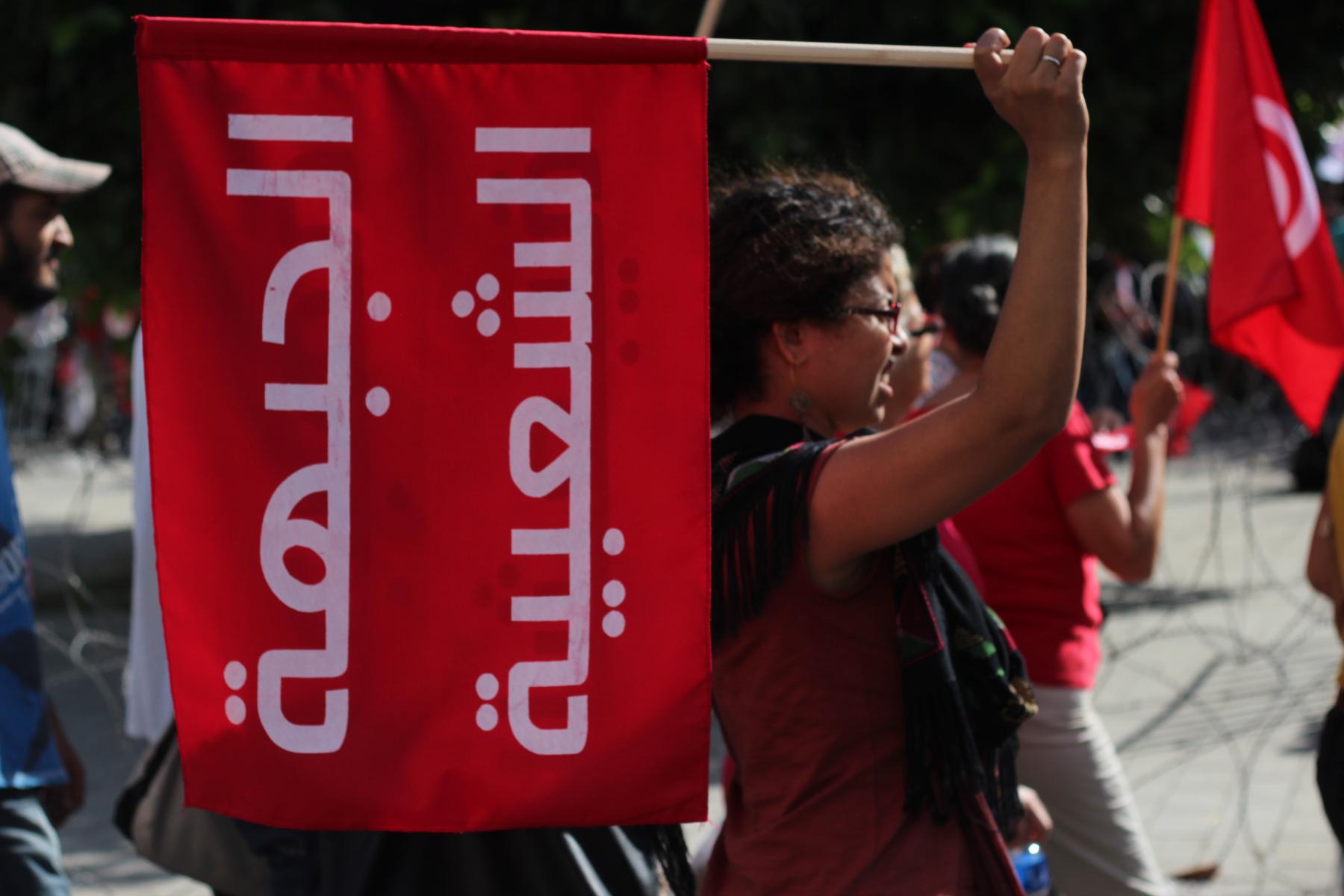 From the beginning, the Union’s message focused on the wellbeing of the Tunisian people as a whole. As the Union’s deputy secretary-general put it, “We cannot look after a political party’s interests without looking after the national interest…The national interest needs to be the red line for all the political parties.”[24] For the dialogue to work, the Union needed both Ennahda and the opposition to soften their positions for the good of Tunisia.
From the beginning, the Union’s message focused on the wellbeing of the Tunisian people as a whole. As the Union’s deputy secretary-general put it, “We cannot look after a political party’s interests without looking after the national interest…The national interest needs to be the red line for all the political parties.”[24] For the dialogue to work, the Union needed both Ennahda and the opposition to soften their positions for the good of Tunisia.
In the wake of the transition from the Ben Ali era, Ennahda emerged as the most organized of Tunisia’s political parties. However, the party struggled to transition from its insular defensiveness and suspicion of outsiders to a willingness to engage in open, transparent dialogue. Tensions also emerged between Ennahda’s more strategically minded national leadership and its grassroots base which is more inflexible on matters of principle such as treatment of members of the old regime.[25]
It therefore was important for the Union to win Ennahda’s confidence by showing that the dialogue was not merely an effort to unseat the party. The Union assured party leaders that Ennahda would remain an integral part of the post-negotiation political system. Fortunately, Ghannoushi and other party leaders, while initially hesitant, proved open to compromise – in large part from a realization that not doing so would risk unleashing a crisis similar to what was occurring in Egypt.[26] Ultimately, Ghannoushi signed the road map that required the Ennahda-led government to resign. Later, during the constitution-making process, Ennahda agreed to remove both a controversial reference to sharia law and an article that called the status of women “complementary to men” rather than simply equal.
A compromise was also necessary for other parties at the negotiation table. Beji Said Essebsi of Nidaa Tounes, the leading secular opposition party, overcame widespread secularist reluctance to engage in dialogue with Islamists.[27] Many opposition members flatly declared that all Islamists were terrorists, and the secularists who negotiated with Ennahda were attacked for working with the Islamists and giving them democratic support. But, as one secular party leader said, “In the context of the revolution, we were able to dare.”[28]
Outreach
The Quartet played a vital role in ensuring a successful negotiation. The Union’s decision to partner with three other respected organizations increased its moral and economic leverage and promoted widespread public trust in the mediation process.[29] Each organization added to the Quartet’s authority; for instance, the Human Rights League (LTDH) is the first independent human rights association in the Arab world.
The Tunisian Bar Association also enjoyed credibility from its long history as “more of an activist organization than merely a professional association,” according to its president. Many Tunisian lawyers helped lead the struggle for independence, and the organization’s role in the opposition continued under Bourguiba and Ben Ali as well.
The Tunisian Employers’ Union (UTICA) increased the Quartet’s economic clout and signified a rare, new kind of unity; employers had not worked together with the Union since independence. Together with UTICA, “the [Union’s] ability to bring the country to an economic standstill was explicit,” making noncooperation from political parties potentially costly.[30]
As a result of the national dialogue, in January 2014 the Ennahda government ceded power to a caretaker government of secular technocrats; the NCA agreed on a commission to oversee elections later in the year; and the assembly passed a new constitution widely praised as one of the most progressive in the region. As one observer put it, the constitution “is a result of consensus, and this is new in the Arab world.”[31]
The constitution establishes a civil state whose laws are not based on sharia; 28 articles are dedicated to protecting citizens’ rights, the right to due process, and freedom of religion.[32] Article 45 binds the state to protect women’s rights and ensure gender parity in elected assemblies – a first in the Arab world. After the vote passing this article, “the assembly and audience stood up spontaneously and sang the national anthem. There wasn’t a dry eye in the house.”[33]
The Tunisian national dialogue was quickly extolled around the globe as a model for other democratic transitions. In 2014, the Norwegian Nobel Committee accepted the nomination of the Tunisian General Labor Union for the Nobel Peace Prize. Meanwhile, Abassi emerged from the process as “a man with popular support and potential for a career in politics.”[34]
Most importantly, ordinary Tunisians benefitted from the national dialogue. “Tunisians didn’t know how to communicate before,” remarked Abdullah Fadhli, of an association of unemployed people. “We were so used to being afraid to say anything of substance outside of our own homes, in case there was an [Constitutional Democratic Rally (RCD)] spy nearby. Now we are learning to talk together again.”[35] The dialogue heralded a new hope for Tunisia and the Arab world: “We did it in a very innovative, democratic way,” one politician said. “I dream that kids who are 15 [now] will look back when they are 60 and say, ‘Those guys put us on the right track.’”[36]
Footnotes
[1] http://www.aljazeera.com/news/africa/2013/10/tunisia-protests-urge-government-resignation-2013102372524126573.html.
[2] http://www.al-monitor.com/pulse/politics/2013/09/tunisia-opposition-leader-interview-national-dialogue.html.
[3] http://www.arab-reform.net/sites/default/files/Redissi%20-%20National%20Dialogue%20in%20Tunisia%20-%20EN%20-%20July%202014.pdf.
[4] http://www.theafricareport.com/North-Africa/spotlight-on-tunisias-union-leader-houcine-abassi.html.
[5] http://www.arab-reform.net/sites/default/files/Redissi%20-%20National%20Dialogue%20in%20Tunisia%20-%20EN%20-%20July%202014.pdf.
[6] Ibid.
[7] http://www.aljazeera.com/news/africa/2013/10/tunisia-pm-pledges-resign-ignite-talks-201310251334486439.html.
[8] http://carnegieendowment.org/2014/03/27/how-leftist-labor-union-helped-force-tunisia-s-political-settlement.
[10] http://www.theafricareport.com/North-Africa/spotlight-on-tunisias-union-leader-houcine-abassi.html.
[13] Ibid.
[14] http://carnegieendowment.org/2014/03/27/how-leftist-labor-union-helped-force-tunisia-s-political-settlement.
[16] Ibid.
[17] Ibid.
[18] http://carnegieendowment.org/2014/03/27/how-leftist-labor-union-helped-force-tunisia-s-political-settlement.
[19] http://www.al-monitor.com/pulse/originals/2013/09/ennahda-tunisia-resign-missteps-revolution.html.
[21] Ibid.
[26] Ibid.
[29] Carnegie institute
[30] http://carnegieendowment.org/2014/03/27/how-leftist-labor-union-helped-force-tunisia-s-political-settlement.
[31] http://www.nytimes.com/2014/01/15/world/africa/tunisian-constitution-praised-for-balance-nears-passage.html.
[33] http://www.washingtonpost.com/opinions/david-ignatius-from-tunisia-hopeful-signs/2014/01/24/f52a7576-8494-11e3-8099-9181471f7aaf_story.html.
[34] http://www.theafricareport.com/North-Africa/spotlight-on-tunisias-union-leader-houcine-abassi.html.

